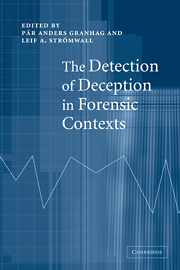Book contents
1 - Research on deception detection: past and present
Published online by Cambridge University Press: 22 September 2009
Summary
Deception – a central characteristic of human life
To perceive, feel, and remember are all examples of central characteristics of life. Provocative as it may seem, it is possible to argue that the act of lying constitutes another such example. It takes little effort to show that lying has played, and still plays, an important role in man's coping and survival in society (Serban, 2001), and many great thinkers have put forward strong arguments that lying is necessary for life (Kerr, 1990). The truth is often perceived as something rare and unattainable, caught only by the hands of gods, whereas the lie is human, all too human. Hence, it is fully understandable that people are fascinated by lies and how to detect them.
Most people not only lie on a regular basis, but are also frequently forced to reflect upon and make decisions about questions of truth and deception. The outcome of these reflections and decisions may or may not be important. To spend time trying to find out whether a compliment of a close friend was really true may seem nonsensical. In contrast, decisions to set aside resources in order to find out whether the information received on the planning of future terrorist activities is valid, or whether a suspected murderer is telling the truth about his alibi, are seldom questioned. It is easy to make a long list of instances where the work of separating truths from lies is of great importance.
- Type
- Chapter
- Information
- The Detection of Deception in Forensic Contexts , pp. 3 - 12Publisher: Cambridge University PressPrint publication year: 2004
References
- 5
- Cited by



